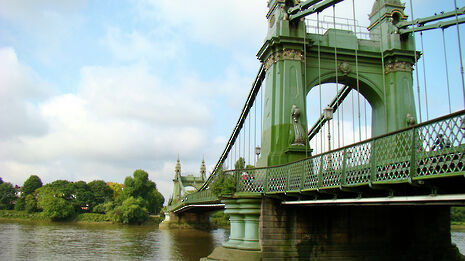Overlooked: Hammersmith’s Hidden History
There’s more to Hammersmith than meets the eye

Hammersmith Bridge marks a turning point in the Boat Race and in the character of the Thames. On the north bank, modern constructions in steel and glass pass to red-brick Victorian mansion blocks and Georgian terraces, whose gardens lead down to private moorings and sleeping houseboats. This stretch, with its weeping willows and nesting egrets, is almost blissfully rural, a slice of green tranquillity in the metropolitan pandemonium of London.
From the water, it does not seem as if much has changed since William Morris moved into Kelmscott House on the Upper Mall, which runs along the river, in 1879. There the English designer, writer, activist and committed socialist ran the Kelmscott Press, which published limited-edition print books, almost 19th century analogies of medieval illuminated manuscripts. Its masterpiece was a luxurious and gigantic woodcut edition of Chaucer, published in 1896, which Morris called his “little typographical adventure”.
Kelmscott Press inspired many other private presses, including the Doves Press at No. 1 Hammersmith Terrace, named after The Dove, a nearby pub built in the early 18th century. Legend has it that a bevy of famous patrons made merry in various incarnations of the public house, dating as far back as the 17th century. There, Charles II wooed Nell Gwyn, a prodigious thespian and one of the few royal mistresses in English history to win popular affection.
The Dove was also the setting for Scottish writer James Thomson’s composition of the celebrated poem Rule, Britannia! circa 1740. The words were set to music by Thomas Arne, a composer whose version of God Save the King became the British national anthem, for a masque at Cliveden about Alfred the Great for the Prince of Wales. Rule, Britannia! achieved instant popularity after its first public performance in 1745.
The poem may have been an attempt to foster an inclusive British identity to unite the English, Scottish, Welsh and Irish. Although Wales and England had been unified since 1536, the Act of Union only joined the English and Scottish parliaments in 1707. The British Empire was beginning to dominate the world in the 18th century and by the 19th century the sun never set on its territories. The words of Rule, Britannia! changed accordingly. Thomson’s original refrain began: “Rule, Britannia! rule the waves.” In the Victorian period, however, patriots sang: “Britannia rules the waves.”
Today we know Rule, Britannia! from the BBC’s Last Night of the Proms, which always includes an arrangement of the song. Also associated with the British Army and the Royal Navy, it still fosters feelings of national pride amongst modern Britons.
 News / Pro Vice-Chancellor leaves Cambridge for Research Ireland 16 May 2025
News / Pro Vice-Chancellor leaves Cambridge for Research Ireland 16 May 2025 News / Wolfson abandons exam quiet period, accused of ‘prioritising profits’ 17 May 2025
News / Wolfson abandons exam quiet period, accused of ‘prioritising profits’ 17 May 2025 Comment / Lectures are optional so give us the recordings14 May 2025
Comment / Lectures are optional so give us the recordings14 May 2025 Lifestyle / A complete Cambridge student’s guide to people watching15 May 2025
Lifestyle / A complete Cambridge student’s guide to people watching15 May 2025 Features / A walk on the wild side with Cambridge’s hidden nature18 May 2025
Features / A walk on the wild side with Cambridge’s hidden nature18 May 2025




